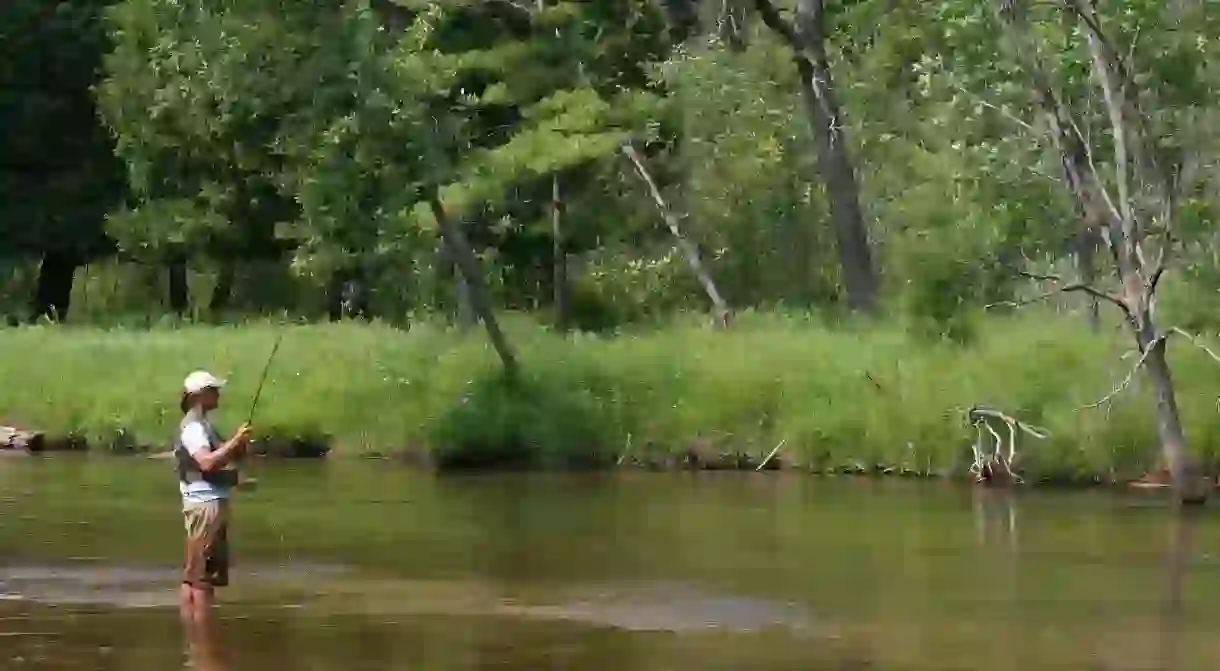The Best Places to Fish in Michigan

Michigan has its origins in the ancient Ojibwe word for ‘large lake’ – and with more than 11,000 lakes in the state, plus hundreds of rivers, you can understand why. Michigan’s waters are extremely generous for both beginner and expert fishermen, but please do check with the Department of Natural Resources, who have strict rules regarding where you can fish at different times of the year. To try your luck while enjoying nature, check out these top fishing hotspots in Michigan.
Did you know – Culture Trip now does bookable, small-group trips? Pick from authentic, immersive Epic Trips, compact and action-packed Mini Trips and sparkling, expansive Sailing Trips.
Saginaw Bay
Head north out of the city of Detroit and you will hit Saginaw Bay on the largest lake in the United States: Lake Huron. Here, you will find that all manner of fishing is popular. Boats are launched with verve, fishermen wait patiently on the shore, and there is also a fishing pier on the Pinconning River. The fishing area is vast, and if you don’t have your own equipment, you can rent it. The carp, bass, perch, and pike are the most popular species in this region. You’ll find this spot to be a favorite when the sun is out.
Burt Lake

At the northern tip of the Lower Peninsula is Burt Lake, where you will find plenty of camping locations or cabins to rent right on the lake. Boat rental is also available, but there is no shortage of banks on which to set yourself up. Popular fish here are bass, trout, walleye, perch, and pike. In the winter months, Burt Lake has become a go-to body of water for ice fishing, and the ice can get as thick as six inches; you can even see people driving out four-wheelers to the very center of the lake itself. Wrap up warm.
Lake Leelanau
Leelanau is Native American for ‘delight in life.’ The waters are clear and the fish abundant after only a short drive from Traverse City. The lake lies split into its north and south bodies and is around 20 miles (32km) long and 1.5 miles (2.4km) wide. It has a reputation for being a home to ‘monsters,’ with many anglers having been pictured on a boat with an enormous bass in the middle of the South Lake. There is a process of restocking, where millions of fish are released into the lake to reduce the pressure on the existing population.
Pere Marquette River

On the east bank of Lake Michigan, north of Grand Rapids, is an extremely popular spot for those who prefer fly fishing. The Pere Marquette River, named after a French explorer, is particularly renowned for its brown trout and salmon fishing. The potential to catch huge fish is what makes this spot so popular. Spring and summer are the best seasons for trout, and the fall is best for salmon. Using waders to fish is a common practice, but for those without experience, the use of a guide is the best option to do so safely.
Lake Erie
Some swear that Lake Erie is the best place to fish in Michigan, and that is not only because of the fish. Historically, trophy fish are pulled from this large freshwater phenomenon, but it is the incredible sunsets that are really hard to beat. The walleye fish is much sought after in this region, and on Erie they are practically jumping out of the waters for even the most inexperienced angler. Lake Erie has tremendous power, though; the weather can become suddenly very stormy, and when it gets rough, you will know about it.
Manistee River

Running into Lake Michigan, the flow of trout, steelhead, and salmon from this tributary is seemingly unending. In the summer, there is action to be found on the surface of the Manistee, as the river provides tremendous fly fishing opportunities as the fish leave Lake Michigan and go upstream. The Tippy Dam is a common spot where the fish are caught on the way up the river during spawning season. Waders do need to be cautious as again, where the river gets wide, it also gets powerful.













